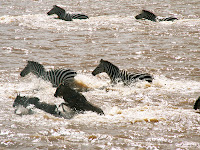 We recently went to see one of the last great migrations. In the transboundary landscape stretching between Kenya and Tanzania is the famous Serengeti National Park and Masai Mara. Millions of wildebeest reside in this area—million. According to the Masai, after God created all the mammals, they took all the left over parts and made the wildebeest. Indeed, these gangly creatures are a sight to see with their long face, blond beard, hooked horns, and flat black tail.
We recently went to see one of the last great migrations. In the transboundary landscape stretching between Kenya and Tanzania is the famous Serengeti National Park and Masai Mara. Millions of wildebeest reside in this area—million. According to the Masai, after God created all the mammals, they took all the left over parts and made the wildebeest. Indeed, these gangly creatures are a sight to see with their long face, blond beard, hooked horns, and flat black tail.
Every year in July and August, the wildebeest migrate from the Serengeti north to the Mara in search of grass. Flying into the Mara you see them everywhere, they blanket the landscape. Its mind blowing to see the numbers.
The biggest attraction is a “crossing.” This is when the wildebeest cross the rivers—the Mara River and the Talek River. If there has been a good rainy season, the rivers are high and current strong, making the crossing for the wildebeest a challenge. Add the crocs and carnivores waiting on the other side, and you have a serious challenge.
I’ve been fortunate to see the crossing twice and there is truly nothing like it. To see such a massive amount of mammals in one place and then to watch them cross the river is spectacular. You have to be lucky to catch a crossing, some people wait days. Eventually, the wildebeest and zebra will gather towards the river, drinking and grazing.
“It does not really look like anything is going to happen.”
“Just be patient,” says the guide.
All it takes is one to jump in and they all follow. One mammal takes a leap of faith, literally, and the others hurl themselves into the river in single file. Snorting, jumping, lunging, and trying to make it to “safety” on the other side (never mind the lions in the bush). The noise is outstanding—the zebras bark as they make their way across and the wildebeest snort, so put hundreds of thousands of these mammals together—the sound alone is mind blowing.
You find yourself cheering for them, praying for them. Please, make it, go, go, you can do it. Then out of the corner of your eye you see the crocs slowly, smoothly swim their way towards the chain of crossing wildebeest. As the current pulls them towards the crocs, the wildebeest fight harder, snorts louder and it’s just a matter of which one for the crocs. The croc swims effortlessly to a young wildebeest and with one bite, the wildebeest is theirs. Dozens nabbed in a crossing. Crocs have no tongues, so after they nab their prey, they prop themselves up on the shore at an angle and hurl their victim in the air, gnaw with their sharp teeth, hurl it up again, gnaw again and swallow.
An awesome cycle of life.
Drought and habitat fragmentation have led to a massive decline in wildebeest and zebra in this ecosystem. The latest threat is a proposed highway across the northern part of the Serengeti. A political promise with catastrophic consequences. We are opposing the development, and like most conservation challenges, you do what you can and hope that reason prevails. What else can you do?







